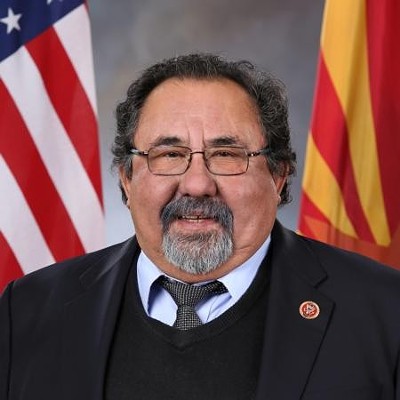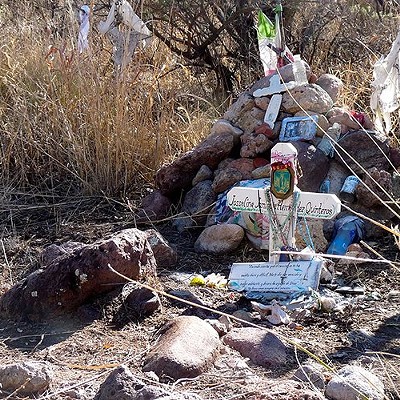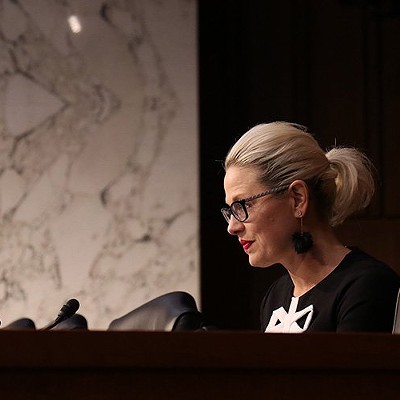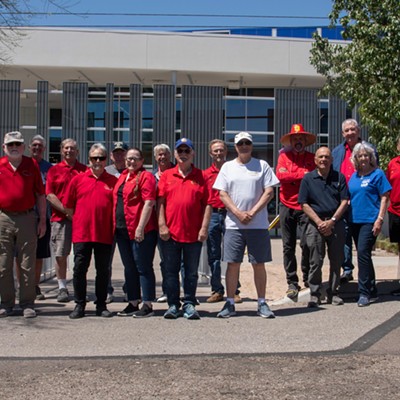Despite a temporary block of President Barack Obama's 2014 immigration action, volunteers arrived at a weekly educational clinic at Pueblo High Magnet School last Thursday evening with an important message for more than 100 people seeking relief: Don't be discouraged and proceed with your plans to apply.
This soothed Mexico native Jazmin Huguez, a mother of five children (four born in the U.S. and one soon-to-be DACA recipient), who's been gathering all the documents needed to go with her application for a three-year work permit, deportation deferral, and a Social Security card, granted to some parents of U.S. citizen and legal resident children thanks to what's nicknamed DAPA, the Deferred Action for Parents of Americans and Lawful Permanent Residents program Obama created last year.
Those applications are not expected until some time in May.
Huguez arrived to the Keep Tucson Together forum with her 19-year-old son, Eliot Ortega. There, longtime volunteer Steve Johnston, who's collaborated with Tucson immigration advocacy groups such as No More Deaths, helped the teen through the final steps to complete his DACA application.
"I can't believe I will actually get a chance," said Ortega, as he meticulously fills out every line of the document. "I am glad to be here, and finally have an opportunity to fulfill my dream." He wants to take classes to become a personal trainer.
Ortega, who was brought here by his parents when he was 2 years old, qualifies for the 2012 version of the program, which was not affected by a Texas federal judge's recent preliminary injunction stalling Obama's Nov. 20 immigration orders.
Late last Monday, U.S. District Judge Andrew S. Hanen suspended the president's order while a lawsuit filed by a coalition of 26 states, including Arizona, seeking to gut the action is resolved.
Two days later, on Feb. 18, the U.S. Citizenship and Immigration Services planned to accept applications for the extended DACA—deportation relief and a three-year renewable work permit that no longer has age restrictions to sign up, meaning certain undocumented immigrants younger than 15 and older than 31 brought to the country as children qualify. But shortly after Hanen's announcement, the agency said it would not process anything until the block ceased.
One week after that, the U.S. Department of Justice officially filed an appeal and a request for a stay to overturn Hanen's actions. If granted, these will allow DACA II and DAPA to proceed as planned, even while the lawsuit remains in court.
Republicans also tried to stop extended-DACA and DAPA, which collectively can affect as many as 5 million undocumented people, with an amendment attached to a funding bill for the Department of Homeland Security, but Senate Democrats continuously blocked it. The bill is due for a vote no later than today, Thursday, Feb. 26.
No decisions had been made on the appeal by press time on Tuesday.
While this plays out, immigration rights advocates are taking a stronger outreach approach to ensure those who can benefit from DAPA and extended-DACA don't hold off on their plans to sign up, even if their applications aren't accepted yet.
"There is a lot of misinformation in the community, so it is very important to get the word out to everybody that they ought to keep doing what they are doing," Tucson attorney Margo Cowan tells the crowd at Pueblo. She's there once a week with Keep Tucson Together, which back in 2011 created a series of educational and legal clinics for undocumented immigrants.
Cowan cofounded the movement alongside Sarah Launius, and since 2012, shortly after the first DACA came to be, KTT took over Pueblo High every Thursday evening for community members to come by and get their immigration questions answered. They also host legal clinics that happen in the afternoons of every first and third Saturday of the month at Southside Presbyterian Church.
Since KTT's inception, volunteers have helped more than 500 people apply for DACA, and they hope to keep their efforts rolling with the new immigration actions.
Those who attend the clinics get to find out if they are eligible for the relief and they are given a detailed list of documents needed to prove they meet the requirements.
"It really empowers people," said Sarah Roberts with the Tucson Samaritans and No More Deaths, who's participated at the KTT clinics since 2011. "The fact that volunteers are coming from the community, it is a ripple effect. They are empowered to go back and then teach others how to apply and bring other people in to learn and fill out an application, and then be a volunteer themselves."
Cowan's optimism was contagious during that two-hour forum. The claps became louder and louder while she ensured the crowd that both Hanen's preliminary injunction and the lawsuit against the federal government wouldn't last too much longer.
On that Thursday, after an hour and a half filling out DACA paperwork, Ortega turned everything over for Johnston to review before mailing it to federal immigration officials.
Ortega was happy. He hoped that soon he won't be the only one in his household celebrating new opportunities.
"I am not just making my dreams successful, but my mom's too, and that is a win-win for me," he said.













